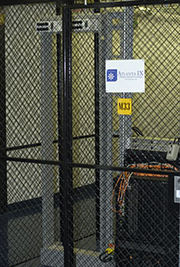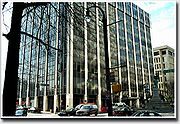
AtlantaIX
Encyclopedia

Internet Exchange Point
An Internet exchange point is a physical infrastructure through which Internet service providers exchange Internet traffic between their networks . IXPs reduce the portion of an ISP's traffic which must be delivered via their upstream transit providers, thereby reducing the average per-bit...
situated in Atlanta, Georgia
Atlanta, Georgia
Atlanta is the capital and most populous city in the U.S. state of Georgia. According to the 2010 census, Atlanta's population is 420,003. Atlanta is the cultural and economic center of the Atlanta metropolitan area, which is home to 5,268,860 people and is the ninth largest metropolitan area in...
, USA. AtlantaIX is a fast growing, neutral and independent peering
Peering
In computer networking, peering is a voluntary interconnection of administratively separate Internet networks for the purpose of exchanging traffic between the customers of each network. The pure definition of peering is settlement-free or "sender keeps all," meaning that neither party pays the...
point. The beginnings of the AtlantaIX can be traced back to 1997. The current version of the AtlantaIX was re-established on September 4, 2003 by Michael Lucking, GreatAccess.com, WV Fiber (now Host.net) and 56 Marietta Street Partners. AtlantaIX was originally created as a free exchange point sponsored by the donations of the founders. Today AtlantaIX continues to run without any re-occurring charges to the participants. In 2007, one time port fees were instituted to aid in paying for a recently upgraded switch infrastructure. In January 2007, Michael Lucking purchased a new Foundry Networks
Foundry Networks
Foundry Networks, Inc. was a networking hardware vendor selling high-end Ethernet switches and routers. The company was founded in 1996 by Bobby R. Johnson, Jr. and was headquartered in Santa Clara, California, USA...
Jetcore 15000 in order to support 10 Gigabit Ethernet
10 Gigabit Ethernet
The 10 gigabit Ethernet computer networking standard was first published in 2002. It defines a version of Ethernet with a nominal data rate of 10 Gbit/s , ten times faster than gigabit Ethernet.10 gigabit Ethernet defines only full duplex point to point links which are generally connected by...
connections. In January 2008 the switch fabric was migrated to a Cisco 6509 in order to support line rate 10 gigabit Ethernet. In early 2008, the AtlantaIX began supporting IPv6.
As of March 24, 2008, there were 64 registered (40 active) participants of the AtlantaIX, advertising over 21,000 unique IPv4 BGP routes.
Technology
The AtlantaIX operates a single Cisco 6509 switch. Participants can connect via 100baseTX, 1000baseSX, 1000baseLX, or 10000baseLR connections. AtlantaIX also offers aggregated links, which are used to provide speeds beyond 1 Gbit/s. The bundling of two 1 Gbit/s ethernet connections can provide speeds of 2 Gbit/s, and so on. While these are still in use, some participants are now upgrading to 10 Gigabit Ethernet10 Gigabit Ethernet
The 10 gigabit Ethernet computer networking standard was first published in 2002. It defines a version of Ethernet with a nominal data rate of 10 Gbit/s , ten times faster than gigabit Ethernet.10 gigabit Ethernet defines only full duplex point to point links which are generally connected by...
.
Location

- 56 Marietta St NW
- 2nd Floor, Cage M33
- Atlanta, GA 30303
History
The original Atlanta Internet Exchange was created in February 1997 by Bay NetworksBay Networks
Bay Networks was a network hardware vendor formed through the merger of Santa Clara, California based SynOptics Communications and Billerica, Massachusetts based Wellfleet Communications on July 6, 1994...
, Epoch Networks
Epoch Networks
Epoch Networks was, at one time, the largest privately held first tier internet service provider ISP founded by Scott Purcell in 1994. It was the fourth commercial internet backbone in the United States...
, Siemens Business Services, and GridNet. Then known as AIX, the peering
Peering
In computer networking, peering is a voluntary interconnection of administratively separate Internet networks for the purpose of exchanging traffic between the customers of each network. The pure definition of peering is settlement-free or "sender keeps all," meaning that neither party pays the...
point provided 10BaseT, T1 and DS3 connectivity. The AIX was located within the Atlanta POP of Epoch Networks. AIX never became a popular Internet Exchange Point
Internet Exchange Point
An Internet exchange point is a physical infrastructure through which Internet service providers exchange Internet traffic between their networks . IXPs reduce the portion of an ISP's traffic which must be delivered via their upstream transit providers, thereby reducing the average per-bit...
, in part due to the high re-occurring costs of connecting to the switch. In March 2000, Michael Lucking, then an employee of Epoch Networks, decommissioned the equipment. In mid 2003, while meeting with a group of other peering coordinators in the Atlanta Area, Michael decided to resurrect the exchange. By August 2003, Michael had worked a deal with 56 Marietta Street Partners to provide space and power, WV Fiber (Now Host.net) to provide the first switch and cabling, and GreatAccess.com to provide domain hosting, and any costs for domain names and IP address registration fees. The new AtlantaIX operated at no expense to participants. In January 2007, Michael provided a second switch capable of supporting 10 Gigabit Ethernet
10 Gigabit Ethernet
The 10 gigabit Ethernet computer networking standard was first published in 2002. It defines a version of Ethernet with a nominal data rate of 10 Gbit/s , ten times faster than gigabit Ethernet.10 gigabit Ethernet defines only full duplex point to point links which are generally connected by...
connections. The AtlantaIX then began charging a one time port fee to aid in paying back the costs of the recently upgraded switch infrastructure.

